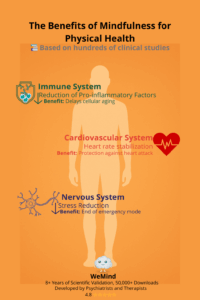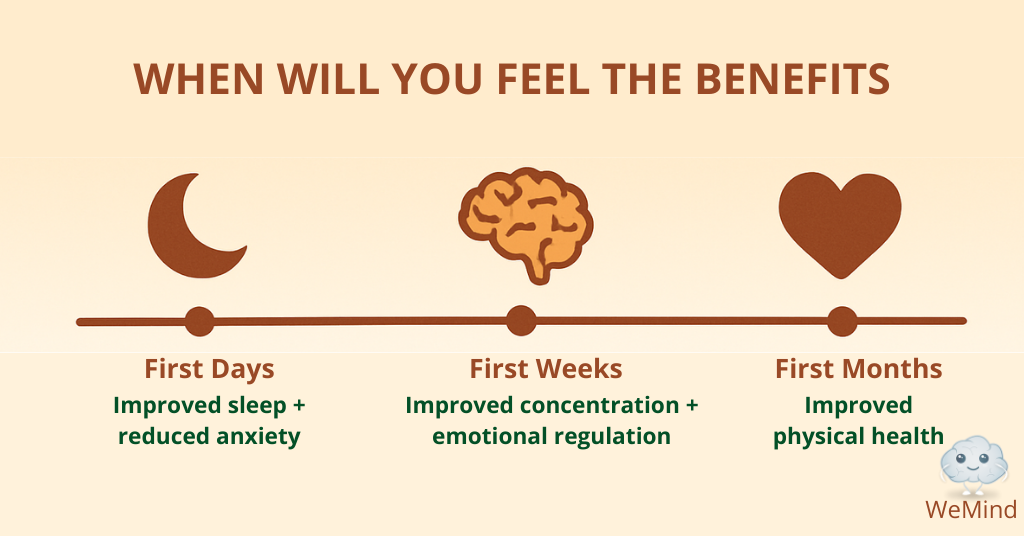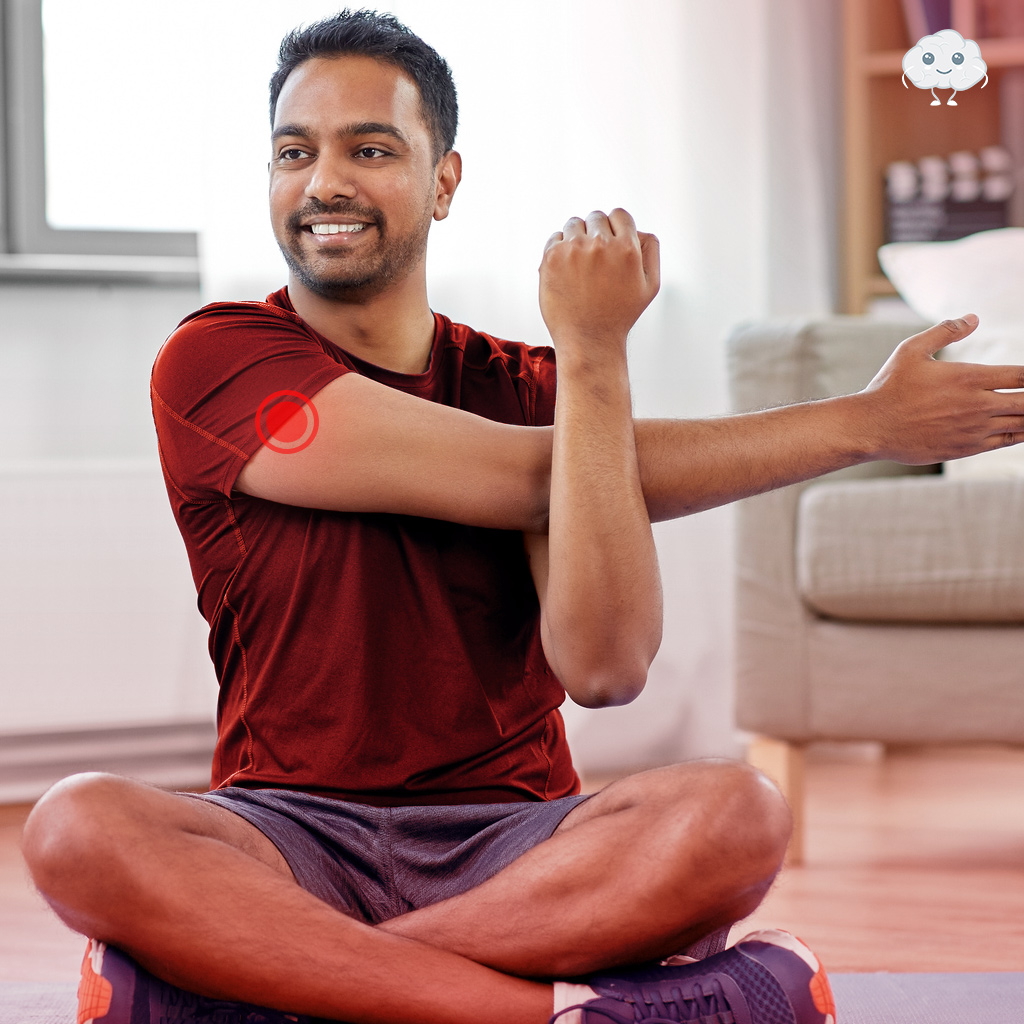If you’re like most people we know – whether high-demand professionals, mothers balancing multiple responsibilities, or anyone feeling the weight of modern routine – you probably already know that chronic stress is affecting your quality of life. Perhaps you’ve noticed that your immunity isn’t what it used to be, or that small situations trigger a disproportionate response from your nervous system.
What many don’t know is that there’s an ancient practice, rigorously validated by modern medicine, capable of promoting measurable changes in the immune, cardiovascular, and nervous systems within weeks.
We’re talking about mindfulness – and the benefits for physical health go far beyond what most people imagine.

What Evidence-Based Medicine Reveals About Mindfulness Benefits
When we discuss the benefits of mindfulness on physical health, we’re not talking about alternative medicine or practices without scientific foundation. We’re referring to hundreds of randomized clinical trials involving thousands of participants, with results published in high-impact scientific journals.
Consistent Strengthening of the Immune System
One of the most well-documented benefits of mindfulness is its direct impact on immune function. Recent research demonstrates that regular practice can:
Reduce Body Inflammation: Studies show significant reductions in C-Reactive Protein (CRP) and Interleukin-6 (IL-6) – substances that, when elevated, indicate your body is “inflamed” internally. In practice, this means lower risk of heart disease, diabetes, and even some types of cancer (Dunn & Dimolareva, 2022).
Decrease the Body’s “Internal Alarm”: Mindfulness reduces NF-κB activity, a kind of “switch” that activates inflammation in the body. When this system is always on (as happens in chronic stress), you become more susceptible to diseases and age more rapidly (Black & Slavich, 2016).
Protect Against Cellular Aging: Perhaps one of the most impressive findings is the increase in telomerase activity – an enzyme that protects your cells from aging. It’s as if mindfulness helps your cells stay “young” longer (Dunn & Dimolareva, 2022).
Strengthen Natural Defenses: In specific studies, increases in CD4+ cells – the “soldiers” of your immune system – were observed. This means your body becomes more efficient at fighting infections and diseases (Black & Slavich, 2016).
Measurable Cardiovascular Benefits
The benefits of mindfulness for the cardiovascular system are especially important for those living under constant pressure – whether at work, caring for family, or managing daily demands:

Healthier Heart: Mindfulness improves Heart Rate Variability (HRV), which is basically your heart’s ability to adapt to different situations. A heart with good HRV is a sign of a healthy cardiovascular system resistant to stress (Heckenberg et al., 2018).
More Efficient Heart Rate: Research documents that people who practice mindfulness have lower resting heart rates. This means your heart works more efficiently, using less energy to pump the same amount of blood (Heckenberg et al., 2018).
Protection Against Heart Problems: The reduction in CRP levels (that inflammatory protein we mentioned) represents direct protection against heart attacks and strokes. It’s as if mindfulness creates a protective “shield” for your heart (Heckenberg et al., 2018).
Nervous System Modulation
One of the most practical benefits of mindfulness for those with intense routines is the 40% reduction in salivary alpha-amylase levels – a substance that indicates how “accelerated” your nervous system is (Heckenberg et al., 2018).
In practice, this means you stop living in constant “emergency mode”, allowing your body time to recover and regenerate adequately.
The Neurobiology Behind the Benefits
When we practice mindfulness, three fundamental changes occur in our brain:
Regulation of the “Panic Button”
The amygdala, responsible for detecting threats, becomes less reactive. This means you stop having exaggerated reactions to everyday situations – like exploding in traffic or getting anxious about an email from your boss.
Strengthening the “Control Center”
The prefrontal cortex, our executive region, becomes stronger. It’s like strengthening the muscle responsible for decision-making and emotional control.
Better “Internal Communication”
Different neural networks begin to work more integrally. The result is greater mental clarity, focus, and ability to handle multiple demands.
Why Professional Guidance Makes a Difference
Although countless free resources are available, there’s a fundamental difference between self-taught practice and a program structured by health professionals.
Evidence-Based Progression
Programs developed by specialists follow protocols that have already been tested and scientifically approved. It’s the difference between training at the gym with a personal trainer and lifting weights at home without guidance.
Specific Techniques for Different Goals
Different types of techniques have distinct impacts on the mind. Professional guidance ensures you practice exactly what you need for your specific goals – whether improving sleep, reducing anxiety, or strengthening focus.
Evidence of Efficacy in Digital Formats
It’s important to highlight that the benefits of mindfulness aren’t limited to in-person interventions. A study with 100 workers demonstrated that a smartphone program, with 10-20 minute sessions over 30 days, was sufficient to reduce inflammation markers in the blood (Dutcher et al., 2022).
The high adherence (97% session completion) proves that significant results are possible even with daily rush.
The WeMind Difference: Applied Science
Our program isn’t based on personal interpretations or generic adaptations of mindfulness. It’s developed by psychiatrists and therapists and grounded in protocols validated by over 8 years of clinical experience with more than 50,000 online users.
Each module is structured to maximize specific benefits for mind and body, following the latest evidence from medical literature.
Practical Implementation: Starting Protocol
For people with busy routines, we’ve developed a gradual implementation protocol:
Week 1: Beginner cycle sessions to learn fundamentals. Week 2: Select a cycle according to your priority (Anxiety, Focus, Concentration, Sleep, Nutrition, among others). Weeks 3-4: Explore other cycles that complement your needs. Month 2 onwards: Repeat previous cycles numerous times to consolidate principles and use quick sessions for daily decompression
When to Expect First Results
Based on our clinical experience and scientific evidence:
First days: Improved sleep quality, reduced anxiety, and less stress sensitivity. First weeks: Improved concentration, social skills, and emotional regulation. First months: Physical health benefits due to reduced constant stress.

Investment in Your Physical Health
As someone who values quality of life, you certainly understand that prevention is always more efficient than treatment. The benefits of mindfulness represent a direct investment in your longevity and quality of life.
Considering that just 8-10 minutes daily can generate measurable changes in your most important physiological systems, the question isn’t whether you have time – it’s whether you can afford not to invest this time.
Next Steps
If you’re ready to experience the benefits of mindfulness in a structured and scientifically grounded way, we offer a 7-day free trial of our complete program. It’s the opportunity to personally verify how an ancient practice, validated by modern science, can optimize your physical and mental health.
References
Black, D. S., & Slavich, G. M. (2016). Mindfulness meditation and the immune system: a systematic review of randomized controlled trials. Annals of the New York Academy of Sciences, 1373(1), 13-24.
Dunn, T. J., & Dimolareva, M. (2022). The effect of mindfulness-based interventions on immunity-related biomarkers: a comprehensive meta-analysis of randomised controlled trials. Clinical Psychology Review, 92, 102124.
Dutcher, J. M., Cole, S. W., Williams, A. C., & Creswell, J. D. (2022). Smartphone mindfulness meditation training reduces Pro-inflammatory gene expression in stressed adults: A randomized controlled trial. Brain, Behavior, and Immunity, 103, 171-177.
Heckenberg, R. A., Eddy, P., Kent, S., & Wright, B. J. (2018). Do workplace-based mindfulness meditation programs improve physiological indices of stress? A systematic review and meta-analysis. Journal of Psychosomatic Research, 114, 62-71.
Heckenberg, R. A., Hale, M. W., Kent, S., & Wright, B. J. (2019). An online mindfulness-based program is effective in improving affect, overcommitment, optimism and mucosal immunity. Physiology & Behavior, 199, 20-27.





